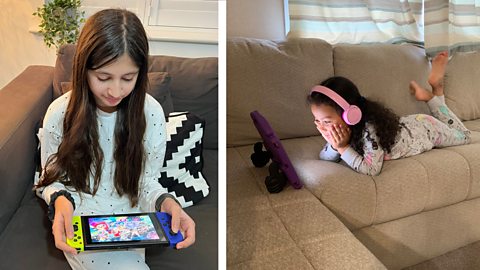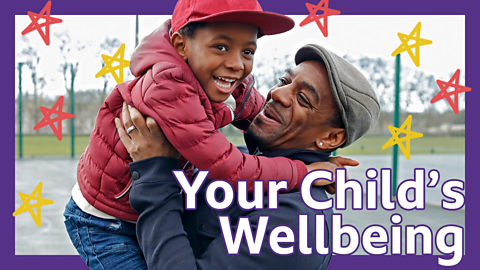Children can be so involved in their gaming that when the headset goes on, they are in a virtual world of their own. For parents, you may feel like you're unaware of what is happening online, but there are steps you can take to help your child keep gaming fun and safe.
Author and parent Giovanna Fletcher gives five top tips for helping your child to game safely and happily.
Giovanna Fletcher: Welcome to BBC Own It's gaming bootcamp's top five tips and cheat codes to keeping your child safe online!
Title: Giovanna's gaming tips
Tip #1
Giovanna: Play video games with your kid! Firstly, it can be fun, yes they'll probably beat you, but playing games together can help build a connection, and open a dialogue about gaming. This way you'll have more of an understanding of the world of gaming and they may feel more comfortable coming to talk to you if something happens that makes them feel uncomfortable while online.
Tip #2
Giovanna: Do your research where you can. Whenever your child starts to talk to you about a new game, speak to them about it and then look online to see if you can find out a little bit more. Remember, parental settings on consoles aren't there to simply stop your kids from playing. From preventing stranger danger to making sure they don't rack up a huge bill. These settings are there to help. And it's worth knowing how to block users or report inappropriate behaviour on their favourite games, just in case you ever need to.
Tip #3
Giovanna: In at number three - talk to your kids about treating others how they would like to be treated while playing. Just because they aren't face to face doesn't mean they can't play respectfully. Sure they might get overexcited, competitive or even a little frustrated, but making sure your child knows how to play nice will help them recognise and ask for help if others are stepping over the line.
Tip #4
Giovanna: From congratulating each other with a GG, that means good game by the way, or talking strategy, communication is a key part of gaming. It helps promote positive reinforcement among friends and between you and your child. Being open with them helps them open up to you. So you can work together to keep them safe online whilst having fun, and it'll also put your own fears at ease.
Tip #5
Giovanna: Our final tip is encouragement. Whatever your child experiences while gaming, whether they're winning on losing, help them process and deal with it. This will lead to a stronger understanding of emotional reactions and help them prepare for situations outside of video games.
And that's it! We hope you've learnt more about how to keep your child safe online and remember there are tons of resources to help you and your child. Make sure you check the BBC Own It website!
1. Play video games together
Gaming doesn't have to be just for your child, it can be for you both. Even if you're a total novice, playing games with your children can help to build a connection between you. You'll understand the gaming world a lot more and it'll make it easier for them to talk to you about any issues they may face.
2. Do your research
Whether it's through chatting with your child, other parents, or even searching online, do some research on the games and devices your child plays on. There are parental settings on your child's device and within games that can prevent stranger danger and stop or set limits on in-game purchases.
It's also worth knowing how to block users and report anything inappropriate in their games in case you ever need to.
To help your child as they game, check out How to stay safe when setting up gaming profiles.
3. Show respect when gaming
It's important that everyone has fun gaming. Talking to your kids about showing respect and treating others how they would want to be treated while playing means everyone can have fun.
Your child might get a little over excited, competitive or frustrated at times, but letting them know what respect looks like when playing will help them to recognise when somebody else is overstepping the line and to ask for help.
4. Communication is key
Communication is important in gaming, and not just for your child and their friends to nail a game-winning strategy. Taking an interest and communicating with your child about their gaming will help them open up to you, so you can step in and help if they have any issues and work together to make sure they are having fun safely.
5. Encourage your child
Your child will go through different gaming experiences, they may find it difficult getting past a certain level or they might be winning at every game they play.
Either way, showing encouragement can lead to a stronger understanding of emotional reactions and can prepare them for situations outside of video games.
Advice provided in consultation with Childnet.
Why not check out some of the other episodes in the series?
What games are your kids playing online? discussing how kids are gaming.
Originally published as part of Own It - the BBC's place children can find help, support and advice on how to live their best and safest online life.
Check out the CBBC Gaming Hub with your child to explore articles all about gaming, cool clips, and even games to play!

More from BBC Bitesize Parents' Toolkit…
Parents' Toolkit
Fun activities, real-life stories, wellbeing support and loads of helpful advice - we're here for you and your child.
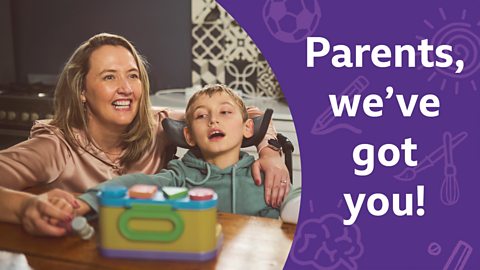
How technology has made parenting more difficult and how to navigate it
BBC Bitesize Parents' Toolkit looks at how widespread access to the internet for our children is causing clashes at home, with negative and positive aspects.
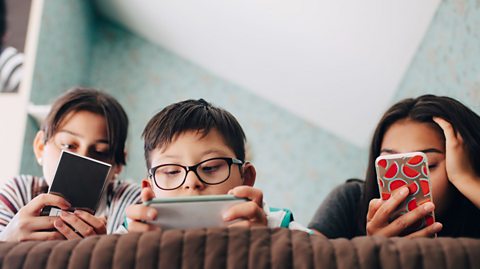
What's the best alternative to screen time? - The Super Tutors
Shona Goodall, 'The Fun One', explains how you can tempt your child away from the tech.

How to manage your child’s online world without clashing
Children and teens spend lots of time online for school and leisure, which can be a worry for parents. Here's some advice on managing your child’s screen time.
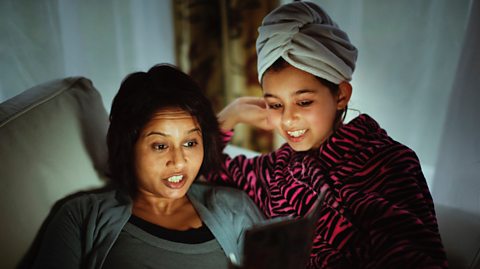
Dear Parents' Toolkit... How much screen time is too much?
Parents across the UK share their thoughts on screens and internet safety. Should I use them in parenting? What is 'screen guilt'? And how do I get my child away from them?
